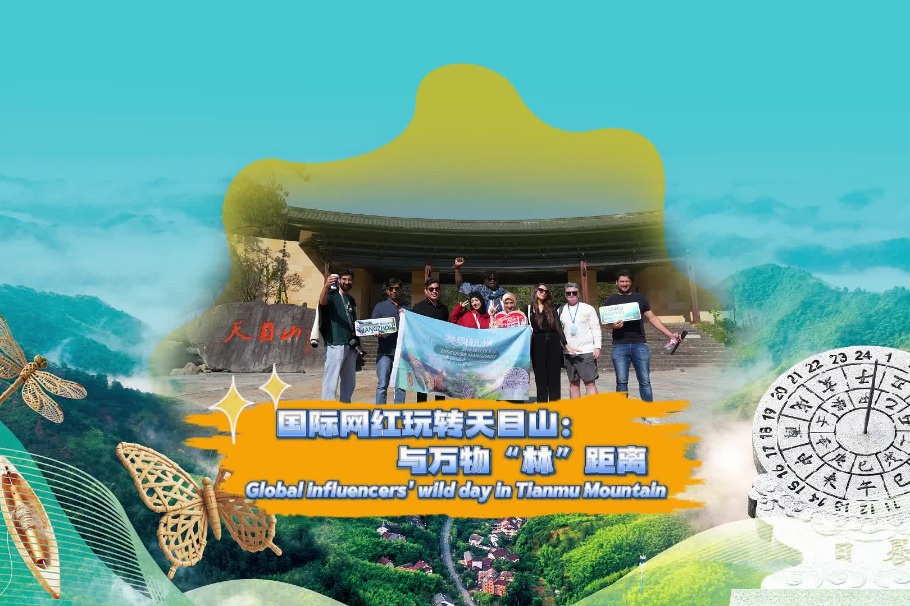China taps global expertise to build world-class dinosaur geopark

HARBIN -- On the sidelines of an international fossil protection forum in Northeast China's Heilongjiang province, hundreds of participants eagerly picked up hammers and carefully scoured the ground for fish fossils, immersing themselves in the hands-on thrill of excavation at the China National Geological Park of Dinosaurs.
Jiayin, a county-level city in the province, is known as the "hometown of dinosaurs," where China's first dinosaur fossil was unearthed in 1902, and today, these prehistoric giants have become its emblem, drawing dinosaur enthusiasts from around the world.
Hundreds of paleontology and geology experts from China and eight other countries, including Russia, France, Germany and Belgium, joined the lively activity during the 4th Jiayin Forum on Fossil Protection and the Symposium on Tourism Geosciences, held on Aug 27 and 28.
"Look at the blackened area. This is where fish fossils are most likely to be found," said Sun Ge, honorary chairperson of the Popular Science Committee of the Chinese Society of Paleontology, as he guided the fieldwork.
At his cue, the crisp sounds of hammering echoed through the valley of the national park, as if bringing the ancient past vividly to life.
The forum was jointly established by the Palaeontological Society of China, Jilin University, Shenyang Normal University, and a number of institutes of the Chinese Academy of Sciences.
Held previously in 2017, 2019 and 2023, the forum aims to bolster the protection of paleontological fossils, particularly those of dinosaurs, and their sites, promote geoscience research and public science education, and strengthen international exchange and cooperation.
Since the discovery of China's first hadrosaurid dinosaur fossil in 1902, Jiayin has yielded more than 10 complete hadrosaurid specimens. "Experts believe there is a large dinosaur graveyard here, with at least 100 more fossils yet to be excavated," said Sun Kexin, a guide at the Jiayin Shenzhou Dinosaur Museum in the geological park.
China established the country's first national dinosaur geopark in Jiayin in 2001, covering an area of 38.44 square km and serving multiple functions such as scientific research, popular science education and tourism.
"Since the first dinosaur fossil was discovered and excavated by Russian paleontologists, experts from home and abroad have been engaged in the excavation work in Jiayin with remarkable achievements made over the years," said Shen Fengbin, a fossil restorer at the geological park.
Fossil research and protection at Jiayin have always benefited from international exchanges and cooperation. Abdul Rahman Ashraf, an 83-year-old professor at the University of Bonn in Germany, is among many of the foreign paleontologists who took part in the forum.
"Over 40 years, I have worked with various Chinese professors and made a good partnership," said Ashraf, who has visited Jiayin 25 times and affectionately calls the county his "second hometown."
Harufumi Nishida, president of the International Organization of Palaeobotany, first visited Jiayin in 2003.
"Since then, I have visited Jiayin countless times, and on each occasion, I have witnessed the remarkable progress of both China and Jiayin. Fossil organisms, including dinosaur fossils, and the ecosystems in which they lived have been well revealed thanks to international collaboration and friendship constructed by Chinese colleagues. A wonderful museum has been established to pass this knowledge on to future generations," he said.
Inside the geopark lies the "Paleontologist Statue Garden," where 24 internationally renowned paleontologists, including 12 from abroad, are honoured for their contributions to Jiayin's geological and paleontological research.
"Jiayin is not only an important site for fossil discoveries but also a bridge for international exchange. Hosting this forum here carries great significance. Paleontology knows no national boundaries; it is a science that thrives on dialogue, cooperation and shared progress," said Wang Jun, president of the Palaeontological Society of China.
- Henan retailer's reparation policy fosters workers' rights
- Shanghai offers blueprint for waterfront renewal
- University licenses smart fish feeding system for 20 million
- Shandong court sentences former insurance chief for bribery
- Culture high on agenda at Sanya tourism summit
- Chinese cities post strong performance in 2025 global innovation index





































